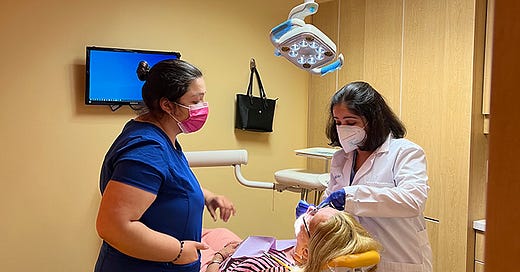How To Get The Best Dental Health
The blog provides brief information on the importance of emergency dental care, common emergencies, and steps you can take to handle them effectively.
You wouldn’t expect an emergency strike without warning, and Dental Implants Woodbridge VA was no exception. Whether it’s a toothache, displaced tooth, or the crown being broken, this is always encouraging since the understanding of how to address it swiftly will go a long way in the improvement of dental health. Such time requires emergency dental care, which can help deal with the problem without aggravating it.
Understanding Dental Emergencies
A Dental emergency can, therefore, be described as any situation in which one needs help to arrest before a tooth is lost, reduce or stop bleeding or relieve severe pain. Common dental emergencies include:
Toothaches: Intense, persistent tooth pain often caused by infection or dental trauma.
Knocked-Out Tooth: It is always generalized, and perhaps rightfully so, that early intervention is desirable in knocked-out teeth when attempting to reimplement the tooth.
Broken or Cracked Tooth: Sometimes, stress and ordinary use of teeth, for example, when the tooth is chipped or broken, the nerves become exposed and cause pain or even become infected.
Lost Dental Crown or Filling: Open cavities containing exquisitely sensitive and accessible tooth tissue are not the ideal situation for preserving them.
Abscesses or Infections: Heat, swelling, and pain, which means there may be an abscess or an infection that needs attention before a system problem.
Why Immediate Care Matters
Prompt attention to Dental Implants Woodbridge is critical for several reasons:
Pain Relief: Many dental emergencies cause severe pain, which immediate care can alleviate.
Prevention of Further Damage: Acting quickly can prevent a minor issue from escalating into a more severe problem.
Save Teeth: That is why in cases of trauma or infection early intervention can help to increase the chances of tooth-sparing.
Avoid Complications: Infections in the teeth can also spread down to other regions of the body and cause some dangerous complications occasionally.
Steps to Take During a Dental Emergency
Contact Your Dentist: Call your dentist immediately. Surprisingly, for the issues involved, many dental offices provide slots for emergencies, if not for routine visits.
Manage Pain: Analgesics bought nationwide are useful in managing pain only if it is short-term. Note that one should not place the aspirin right on the gum area because it might prove quite uncomfortable.
Knocked-Out Tooth: For any tooth that has been traumatized and has fallen out, the handler should avoid holding the tooth by the root part; rather, they should hold it by the crown. If soiled, wash it with water but do not scrub it. Attempt to replace it in the socket if possible. If not, place it in some milk or saliva and rush the patient to a dentist within the next hour at most for the tooth to be re-implanted.
Broken Tooth: Let your mouth warm water to rinse the area of the mutilation and remove and particles of food or debris. If there is blood, one should use a gauze pressing it gently. Apply an ice bag outside the mouth to help with inflammation.
Lost Filling or Crown: Save the filling or crown if possible. You can temporarily reattach it using dental cement available at pharmacies. Avoid chewing on that side of your mouth until it’s repaired.
Preparing for Dental Emergencies
While it’s impossible to predict emergencies, certain precautions can be taken:
Regular Dental Visits: Preventive dental care implies that the dentist is able to identify some difficulties that could turn into emergency cases in the course of casually scheduled dental check-ups.
Maintain Good dental Hygiene: To reduce the possibility of Dentist in Woodbridge VA, people should brush their teeth at least twice a day, floss, and use mouthwash.
Wear Mouthguards: Wearing the mouth protector is required when you have contact sports or when you clench or grind your teeth at night to reduce the probability of any harms on your teeth.
Know Your Dentist’s Emergency Procedures: Learn the contact details you have with your dentist and the protocols he will advise concerning any case of emergency after working hours.
Conclusion
A dental emergency is not a comfortable situation, but with the right measures, one can go through it comfortably. Proper responses, including meeting the dentist and handling pain, will provide relief from discomfort and added destructive progression. Do not forget that not only pain but also the health of teeth and their preservation can be treated. If you take your time and go prepared, you stand a good chance of getting the right help when you experience a dental emergency.




